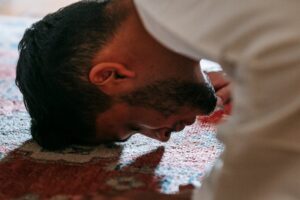“For your Lord has decreed for one and all: You shall not worship other than Him. And to your parents, you shall be good. Should either one of them, or both of them, reach old age in your care, then you shall not say to either of them even so much as: Fie! Nor shall you rebuke them. Rather, say to both of them a gracious word, in loving kindness.”
~ Surat Al-Isra’, Verse 23
This month’s theme for Quranic Reflections is “respect to parents.” One of the most famous verses known by many Muslims today regarding respect towards parents is Surat Al-Isra’, verse 23. Many people, including myself, grew up hearing this aya being uttered from the mouth of their parents. However, have you ever thought about why it is that this verse from the Noble Quran is so popular? The answer is that it always hits home for every individual who hears it. Unfortunately, this verse is the shocking reality for many people to this day.
Allah (swt) is very specific in this aya. He does not just say “be good to your parents.” Rather, Allah (swt) specifies by saying, “you shall not say to either of them even so much as: Fie!” You may find yourself asking, what is the word “Fie?” This is one of the most commonly used words of impatience, frustration, and disrespect. Oftentimes, it is used towards one’s own parents. Allah (swt) reminds us as Muslims that we shall not show our parents any sign of frustration or disrespect and that we should only use words of graciousness and kindness.
Something very interesting about this verse is that Allah (swt) specifically mentions when either one of your parents, or both, reach an old age in your care. The key words here are “in your care.” Why is this so important? From infancy to adolescence, parents take care of their children. They become restless, overworked, and frustrated just so that their child can grow up to be healthy and successful. Parents take care of their children while they are helpless and in need. Now comes the time that the parents have grown to an old age, they become the ones that are helpless and in need of assistance. So, it is the responsibility of the offspring to give back and assist their parents just as they did for them when they were young. This eventually causes frustration and impatience amongst the offspring, despite that their parents did the same for them when they were young.
Let us take a moment to think about the society that we live in today. In today’s society, it has become commonplace to see and hear children disrespecting their parents on a daily basis. I would even go as far as to say that it has become the new normal. Only Allah (swt) knows what children will be like once they become adults.
When speaking about the subject of respecting parents, one incident that the Prophet (PBUH) encountered always comes to mind. A young man once approached the Prophet (PBUH) complaining about his father. He claimed that his father was taking from his money and he had no knowledge as to why. The Prophet (PBUH) responded by requesting the young man to leave and bring his father back with him. While the man was gone, Angel Jibreel came to the Prophet (PBUH) and told him to ask the father, when he arrives, what he was reciting on his way to him. Upon arriving, the Messenger of Allah (swt) asked the father if what his son was saying is true. The father responded by saying, “Oh Messenger of Allah! If only you knew what I was using the money for: I am using the money to take care of his aunt who has nothing. I am using the money for his own family. The Prophet (PBUH) then asked the father what he was reciting on his way to him and the father claimed that it was poetry. The Messenger of Allah (swt) asked the man to read the poetry aloud. Some parts of the poetry included “O son, I nourished you when you were a baby. I sacrificed time and wealth for you so that I can keep you healthy. Whenever you were sick, I was always the first to be up and by your side. And now you have given me a reward…harshness and mistreatment! At this point, the Prophet (PBUH) had soaked his beard with tears. The Prophet (PBUH) grabbed the young man by his chest and said to him, “you and everything that you own belongs to your father!”
The Prophet (PBUH) once came across Abdullah Ibn Zubair, a sahaba, while he was in a state of deep sorrow due to the passing of his father. Abdullah told the Messenger of Allah (swt) that he was not crying because his father had passed away. Rather, he said that he was crying because his easiest door to paradise was just shut.
Many lessons can be learned from the aya and two hadiths. However, the main lesson to be learned is that no matter how much we do for our parents, it will never be enough to make up for the struggles that they went through for us from our infancy until adolescence. We must remind ourselves that our parents do not owe us anything. Rather, it is us who owes them everything, so we should treat them with the utmost respect and kindness. Remember, as the Prophet (PBUH) once said, “Paradise is under the feet of your parents.”
By Ahmad Salah




